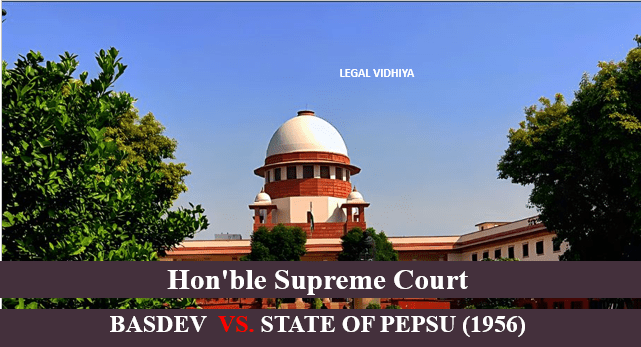
| Citation | Air 1956 SC 488 |
| Date Of Judgment | 17 April 1956 |
| Court | Supreme Court Of India |
| Case Type | Indian Penal Code, 1860 |
| Appellant | Basdev |
| Respondent | State Of Pepsu |
| Bench | N.H. Bhagwati And Chandrasekhara Aiyar |
| Referred |
Facts of the case
In the referred case, the appellant’s name is Basdev. He was an ex-military man who lived in the village of Harigarh. He was charged with the offense of murdering a boy named Maghar Singh, who was 15 or 16 at the time. They were there to attend a marriage in some other village. The appellant was drunk that night. He asked the boy to move a little so that he would be able to take a seat. Although the boy declined to move, the appellant took out a pistol and shot the boy in the abdomen. The injury caused the boy to die on the spot.
The session judge gave a lesser punishment as the appellant was excessively drunk. It was brought to the court’s attention by the witness named Wazir Singh who said that the appellant was almost in an unconscious state. The presumption was that the intention to kill someone was missing since he was in a highly drunk state
Issues
In the honorable Supreme Court of India, the following issues have been raised:-
- Whether or not the appellant’s offense of murder be reduced to culpable homicide not amounting to murder?
- Whether or not the appellant can use the defense of intoxication?
Arguments
Argument of Appellant- The appellant should avail themselves of the defense of intoxication in the present case, as it was because of the highly intoxicated state that the appellant was not able to form any intention to kill the boy. The appellant could not have had the requisite intention to kill the boy but was so deeply engrossed in drinking that they were unable to understand the consequences of their act of shooting a boy. Hence, the appellant should be granted the defense of intoxication under IPC, and thus the offense of murder should be reduced to culpable homicide not amounting to murder.
Argument of Respondent- The appellant voluntarily consumed alcohol and thus became intoxicated. Following that, he was not so intoxicated that he could not understand the nature of his act of taking a pistol and shooting a boy. The defense of intoxication should not be granted to the appellant, and he should be charged with the offense of murder and not culpable homicide not amounting to murder.
Judgment
The honorable court is of the opinion that even though the appellant was in a drunk state, he was fully aware of the consequences of his act, and thus, the influence of the alcohol he consumed, which caused intoxication, was not significant. The evidence, which states that the appellant was able to move independently and did not need help from anyone, proves that he was not so drunk that he could not understand the nature of his act.
Moreover, he did make a choice in selecting a seat, which indicates that the appellant can make informed decisions. Additionally, he pleaded with the witnesses after the act, which suggests that he understood the nature of the act he committed and also pleaded, signifying that he knew the consequences of his actions. Therefore, the Court is of the opinion that the appellant should not be granted the defense of intoxication.
The court delved into the intricacies of a person’s knowledge and intention to commit a crime. Since involuntary intoxication is a defense under IPC, in voluntary intoxication, the level of intoxication must be taken into account. This helps deduce whether the accused was intoxicated to such an extent that they could not be in their full capacity or consciousness to decide the nature and consequences of their actions.
This deduction varies from case to case, depending on the specific act committed by the person, which indicates their mental capacity to form intent. The honorable court has distinguished between the terms ‘intention’ and ‘knowledge,’ stating that motive prompts a person to form an intention, while knowledge is the awareness of the consequences of the act
The honorable Supreme Court held that the appellant should be charged with the offense of murder and was reluctant to reduce it from murder to culpable homicide not amounting to murder. The court opined that even when the appellant was under the influence of alcohol, his level of intoxication was not to the extent that he could not have the mental capacity to form an intention.
Thus, he should not be granted the defense of intoxication. The appellant has not been able to prove that the act he committed was done under heavy intoxication to the extent that he was incapable of forming any intention or comprehending the consequences of his actions. Hence, he was held liable, and the appeal was dismissed.
References
- https://indiankanoon.org/doc/504992/#:~:text=In%20this%20case%20a%20prisoner,was%20pleaded%20as%20a%20defence.
- https://main.sci.gov.in/jonew/judis/744.pdf.
This Article is written by Rajat Srivastava of Army Institute of Law, Mohali, Intern at Legal Vidhiya.




0 Comments